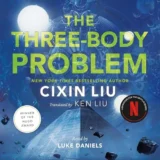
OBIR: Occasional Biased and Ignorant Reviews reflecting this reader’s opinion.

Wasps at the Speed of Sound
Published by Five Rivers Books, Neustadt, Ontario, Canada in 2013.
Editor: Lorina Stevens
Cover art: Jeff Minkevics
Lost Jenny – All stories by Derryl Murphy
Premise:
A somewhat uncouth young chappie is enjoying watching the end of the world from an apartment tower roof, occasionally taking time off to trash some of the apartments just for fun. Seems aliens are dismantling the moon and smashing bits of continents (starting with California oddly enough) as a warning they’ll get tough unless Earth hands over the female alien they’re looking for. Unfortunately nobody knows who or what they’re talking about.
Turns out our young thug already knows the alien, slightly, and on running into her again decides to help her. This will probably make the other aliens really mad. Things can only get worse.
Review:
You don’t really think the end of the world will witness humanity either panicking or stoically confronting their fate with stiff upper lips do you? Fact is quite a few people will be rather content, even happy, as all the people who’ve been picking on them will be about to get theirs. You’d be amazed how many people would enjoy seeing the world they’ve learned to hate get smashed. They won’t mind dying, as long as everyone else dies with them. In truth the protagonist seems to be rather invigorated by the impending collective fate. Appears to regard it as a great equalizer, which, of course, is exactly what death is.
Mind you, it is possible to face death with little more than idle curiosity. Back around the time of the Cuban Missile Crisis I asked my dad, a serving RCAF officer, what he would do if nuclear war broke out. “Well,” he replied, “if I’m home I’ll send you and your brother and your mom down into the basement, and then I’ll go up on the roof and watch. Probably have time for a couple of shots of whiskey and at least one cigarette. Should be quite a show.”
And the Aliens may not even care. In this story they’re focused on getting the “woman” back. Could be the destruction of the Earth is nothing more than a quick and easy solution to their problem, the consequences of which may mean nothing to them. Greater intelligence may equate to superduper rationalization powers. Then again, maybe they’re too alien for us to understand their motives. These are among the reasons I hope we NEVER contact an advanced alien civilization. Nothing good can come of it. And if we are more advanced than they are, I pity the poor aliens.
Point is the reaction of our “hero” to events is perfectly credible. Many people are liable to behave in exactly the same way during the end of the world. They will be quick to take advantage even though they are doomed, maybe because they are doomed. A psychologically astute story.
Island of the Moon
Premise:
In the near future a TV journalist is driving through the Martian-style desert of Madagascar to reach one of the few remaining stands of trees in order to broadcast live the death of the last remaining Golden Lemur, a sickly beast monitored round the clock by biologists. So many animals have recently become extinct it has become a topic of some interest, and it is hoped actually capturing an extinction live on camera will be good for ratings.
He is accompanied by one of three aliens who landed on Earth a decade earlier and have been wandering about ever since, studying humanity without explaining why. This one is keen on witnessing the extinction event. When it occurs the alien becomes, for the first time, quite talkative. Unfortunately.
Review:
This story captures the sadness and depressing finality of extinction quite well. It is a warning of sorts, a lesson that is timely and pointed, but also futile because it is preaching to the converted. The people who actually hold the fate of the world in their hands won’t be reading it. They’re having far too much fun manipulating humanity like so much wet cement to be shaped into a monument to their ego and ambition. We haven’t got a chance, frankly.
But as one famous biologist (whose name I can’t remember) once pointed out, the last member of a species doesn’t know it is the last. It only knows that it is alone. The real torment and angst is in the minds of human observers. Question is: who or what will mourn our passing? And don’t say the cockroaches. They don’t care. Really. They don’t. The little buggers.
Those Graves of Memory
Premise:
Bryce is a human being, and a member of the Stewardship and Extinction Committee founded seven billion years earlier. Bryce is a charter member. There are seven others. Together they constitute what’s left of the human race. His drone (which preserves most of his memories, more than his brain is capable of handling) thinks it has found Earth, the original home world of mankind. It wasn’t easy. The last sentinel guarding it had gone insane and hidden it hundreds of millions of years ago. Being as old as it is, the Earth is a ball of rock as featureless as a billiard ball. Bruce amuses himself watching his drone build a facsimile of his birth neighbourhood out of solid rock while he waits for the rest of the committee to arrive. Sad, pathetic Earth. Once the others are present they’ll decide what to do with the poor old thing.
Review:
A Stapledonesque story, apart from some ‘fresh’ memories installed by the drone which encapsulate a particular moment in time. Seems the physical solution to being immortal prevents poignant memories brought on by unexpected reminders, unless your drone grants you access to its backup storage of your memories. But, in order to do that, you have to swap out recent “new” memories in order to make room for new “old” memories. Turns out that one’s flesh cauliflower isn’t as holistic and infinite in capacity as most SF writers assume, at least not over billions of years. This is an exceedingly well thought-out exploration of the limitations of an immortal mind. However, the fundamental conundrum remains; the eight surviving humans are in better shape than Old Earth, but for how much longer? A sad and poignant glimpse of our far distant future.
Father Time
Premise:
The unnamed protagonist has a problem. His father is dying, and keeping bedside vigil is more than usually difficult because his father keeps dropping by to check on how things are going. His father being a time traveler you see. The main character has long hated his father for abandoning him as a child, but it’s all the more frustrating because his father periodically and unexpectedly pops in to apologize, and then he’s off again. Now his father is offering him family time, the opportunity to join him in his travels. May be a bit late for that. Or too early?
Review:
This story is actually quite good but I find the ending confusing. I think I’ve figured out the complexity of it all but I’m not sure. Did I mention I get easily confused if things aren’t strictly linear? (Things in plots, things in life, things in mind, etc.) Probably part of the aging process, though I assume an exaggeration of something that has always been a part of me. I can be pretty sharp, but only when I know what I’m talking about. The rest of the time people confuse my vague, meandering focus with an equivalent state of mind. Come to think of it, they’re right. But at least I’m sharp enough to understand that. What’s the solution? Expand my mind? Further my education? Seek out new experiences? Nah. Too lazy. I’ll just stick with the tried and true. Now you know why the human race doesn’t progress as fast as you think it should. People like me hold it back. Still, that implies I’m a typical “everyman.” Consequently my critiques may have some value. Maybe.
Wait a minute. I believe I’m obligated to make a point. Ah, yes, the story is cleverly constructed and most intriguing, if a bit beyond me.
Day’s Hunt
Premise:
Davies is a harpooner serving aboard the whaling vessel Ew York Tim sometime in the far future when the oceans are crowded with the garbage of centuries and the only technology to be had depends on whatever you dredge up from the bottom of the ocean. Residual radiation is a bad thing, what with everyone developing more and more tumors as they age, but at least the mutant whales are tasty, if difficult to catch. Besides, whale meat makes a refreshing change from the centuries-old bits of food floating amid the garbage.
Review:
Ever resourceful, mankind endures on its own garbage, especially since the garbage has developed a renewable ecology of its own. Darn good thing, too, considering the natural ecology of old has long since disappeared. Derryl has a lot of fun running with this decidedly odd retelling of Moby Dick. More of a vignette than a story; the scene is the thing. A warning tale of sorts, I suppose, but mostly just a bit of fun.
Wasps at the Speed of Sound
Premise:
If a wasp flies at you it’ll go right through you. In fact, all insects have developed exaggerated natural powers. Fireflies can hit sub-light speeds. Ant lions can strip you to the bone in a flash. So Abe wears home-made armour when he sneaks up on the nests with his home-made flame thrower. Even his country home is home-made, having been converted into a somewhat bug proof shelter. His buddy Mike helps him kill bugs. Then Ryan shows up, an electronics salesman who claims the bugs communicate with him in Morse code. He suspects the bugs are up to something, following a master plan, and if the few humans left alive can only figure out what it is they might be able to win the war. Trouble is, not much time left. The bugs are on the verge of victory.
Review:
This story put me in mind of this or that B movie, including the one where bugs spell out messages with their bodies, but nevertheless Derryl’s tale is an original take on the theme of bugs gone mad, or nature’s revenge if you will. How bugdom has developed super powers (including intelligence) is explained, but I was a little unclear for a while why they make so limited tactical use of their newfound abilities. Turns out there is a reason. This be a fascinating story about the real aliens in our midst. And yet … and yet … maybe … not too alien?
What Goes Around
Premise:
Henry Angel produced and starred in a TV pilot for a show called Space Cops back in the 1950s. The network didn’t like it and it never aired. He soldiered on with bit parts in B movies but, oppressed by failure, wound up a middle-aged alcoholic who sat around on his couch watching TV and waiting to die. Then a “ghost” from the future began visiting him, a future oddly familiar, and one the “ghost” wants him to visit.
Review:
In a sense this is old-fashioned SF about an old-fashioned SF TV show and its unintended consequences centuries later. That future civilization is derelict is also old-fashioned, but the fact that the dress, habits, and behaviour of our descendants are oddly askew and different is original and entertaining. Granted, the central plot element is a standard science fiction motif, one so wholly absorbed into a recent movie franchise that it might be impossible for younger readers to recognise this story is actually a fresh take on the concept written before it became the mother of all clichés. I like it. I am very comfortable with it’s old-fashioned approach, pleased that it addresses the future of humanity on a grand scale, and satisfied with its low-key, somewhat melancholy ending that reduces the whole conundrum down to Henry’s personal fate. Old fashioned, yes, but delightfully and playfully old-fashioned.
Note: I used “old-fashioned” six times in a single paragraph. Shows how “old-fashioned” I am!
Blue Train
Premise:
In a world gone largely dry Andy is out prospecting for water in Southern Alberta with the aid of his snarky A.I. Quad. Miraculously, they find a spot where the long hidden water table has finally risen to the surface. Trouble is, so has a California “snifter” robot, and because of that, a mobile sentient pipeline is approaching to steal the water and pipe it down south. Andy is very upset. It can only mean the Province has ceded a portion of Southern Alberta to California and he can’t legally intervene. Not only will he not benefit from staking a claim on this vital resource, neither will his fellow Albertans. What to do?
Review:
In a world where the CEO of Nestle has stated access to water is not a human right, and many a small town has discovered its local water source purchased and being drained by Nestle to sell back to them as bottled water, this story is frighteningly prescient. The tech depicted is still far in the future, but the social conundrum, governments using access to water to control the loyalty of citizens, is only a few years distant at most. Some say it is beginning to happen all ready. Which makes it all the more important to consider what Andy choses to do as a role model that may be what is necessary to avoid a future dictated by a government with an absolute monopoly on the single most important resource of all. This story more relevant now than when it was written.
The Abbey Engine
Premise:
Marty and Stan are visiting Hoover Dam. Security is everywhere, determined to prevent agents of the Federal government from destroying the dam which, after all, is holding back a toxic lake seething with industrial poisons. But Marty and Stan aren’t Feds. They’re just good old-fashioned eco-terrorists armed with a secret weapon.
Review:
This is a remarkable vision of a potential use for an advanced technology normally described as incredibly beneficial and absolutely necessary for the future wellbeing of humanity. Turns out, maybe not. Might be an idea to hold up on some of those government research grants till people have thought things through. Once unleashed, no putting it back where it belongs. The author adds a playful touch which strains credulity, though not if you consider it a manifestation of an extremely advanced version of the tech. The virtue of an imaginative story like this is it makes contemporary technology seem positively benign in comparison.
The History of Photography
Premise:
Laird is one of the last film photographers, specializing in large format nature photography, very much as Ansel Adams used to do. Only now the air is everywhere polluted, and even the insects tend to be mutants of one kind or another. Nature barely functions, and only man and his technology can be said to flourish. Laird is getting old. This may be his last expedition.
Review:
The story does in fact offer a description of the history of technology, or at least the beginning of the concept. It also offers in fine detail an explanation of how photography actually works, or rather the multiple ways it can work. Where the science fiction aspect enters in has to do with the author’s speculative extrapolation of digital and computer technology trends and the consequent inevitable fate of the art of photography and, indeed, humanity itself. People are expecting Skynet. This story suggests sufficiently advanced technology will accomplish something infinitely more subtle yet equally as dangerous to the human condition and what it means to be human. A thoughtful and thought-provoking tale, and just a tad depressing. A bang-on description of what photography actually is, though. Learned quite a bit.
Summer’s Humans
Premise:
Cam and Laura are settlers on a primitive planet. They thought the colony would be a fine place to bring up their two young boys and three-year-old daughter Jenny. The Makaepie, the indigenous natives, are of course profoundly grateful to be employed by the humans and be lifted culturally above their miserable subsistence-level non-technological mud hut culture. All the more surprising, then, that the Makaepie would launch a planet-wide revolt utilizing seized modern weapons even to the extent of shooting down fleeing spacecraft. Why, the Makaepie turned out to be as brutal and ruthless as their civilized masters. Impossible! And yet …
Fortunately their trusted servant “Summer” leads them to his village and offers the family sanctuary. But for how long? And for what reason? It can hardly be loyalty, in light of what is happening elsewhere. Laura finds it very hard to hide her fears from her family.
Review:
This is an original story written for this anthology. For me its subject is a nostalgic throwback to my childhood when innumerable African nations fought (successfully) to overthrow their colonial masters. One aspect common to many of the them was the shock and disbelief among many white settlers that their good and loyal blacks would turn on them. They just couldn’t fathom it. The revolts and revolutions ran completely counter to their cherished vision of themselves as stern but just benefactors. Some colonies gave in quickly, others pursued their own white-directed independent status for decades, but in the end every single one of them lost and became black-ruled. They probably should have seen it coming, but they didn’t want to. Today, Africa as a whole is far from settled and secure, but most conflicts these days are internal political shenanigans rather than racially motivated outbursts, so there is hope that all peoples (and Africa is very diverse) will learn to live together.
This story implies human colonists might make the same sort of mistake dealing with allegedly lesser alien cultures. It does seem to be a habit of our species, in dealing with internal factions, as history proves time and time again. Something to grow out of, or perhaps to adapt away from. On a small scale, this story hints at a potential for coping with our inbuilt faults. Perhaps we are not as hopeless as we think. A cheerful thought, what?
CONCLUSION:
Every story in this anthology is highly imaginative and often quite subtle. Derryl Murphy has put a great deal of thought into working out all sorts of unexpected implications and consequences of near future trends and technologies. If you ask me, science fiction at its best. Really good stuff.
Check it out at: < Wasps at the Speed of Sound >










An excellent review, Graeme! In fact, I’m gonna have to get this collection just to see what Derryl’s been up to since I saw him last; sounds like he’s developed into a heck of a writer!